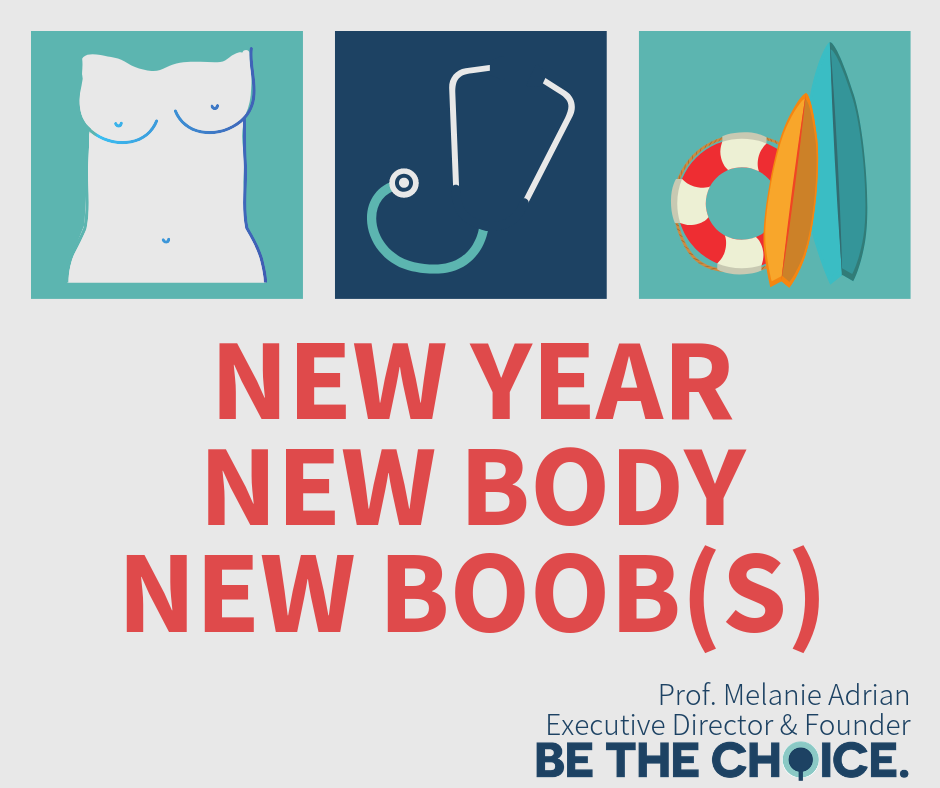
The ball is about to drop. Whilst many will be celebrating the turn of 2019, this will be a very different year for the 27,000 or so Canadians who will be diagnosed with breast cancer.
Once breast cancer has been confirmed, the first treatment option is often surgery. No matter how skilled your surgeon, it will change your body. Your mind too (but that’s for another post). How your body will look, feel and act after the healing begins varies significantly and is hard to predict. For patients, this is one of the most difficult parts of the breast cancer road: the unknown. The decision around surgery is often the first and most difficult. Take it from me, I’ve been there.
Hearing that my “breast had to go”, from one of the first surgeons I consulted, was devastating. It was 2011, I was in my mid-thirties, and I was an avid surfer (and law professor). My doctor’s pronouncement brought up nightmarish images of competing on the open sea with Bethany Hamilton, the famous one-armed surfer. I had no desire to be the one boobed-surfer. How to buy Xanax online http://kendallpharmacy.com/xanax.html
I resisted. I resisted because of vanity. I resisted because I was sure there was another way. I resisted because my breasts were part of my sexual identity. I was told that I was “a silly girl” for delaying surgery in search of alternatives. I put the medically-framed patriarchal bullshit aside and delayed my decision by a few weeks. Deep down, I felt that I had to connect to the decision in order to move forward, for the good of the short and the long term.
I sought alternatives far and wide. I knew that surgery was my only immediate choice because my tumor was large. I understood that it had to be removed. But how? What impact would this have on how my body would function afterwards? How would it look? How would it make me feel? If I were lopsided, how would that impact getting up on that board? How would I look wearing a slinky little something to watch the sun set? No one could (or would) answer these questions for me because they were all focused on making me cancer-free, not anxiety-free.
The anxiety over cancer treatment and its impacts can not only be paralyzing, it can lead to a host of non-healthy outcomes: depression, worry, over-eating, not eating, sugar highs (and lows). Most often, it results in over treatment. More and more breast cancer patients are candidates for less intrusive surgeries that have the same long-term survival rates than those that are more radical. Dealing with these anxieties should be a standard part of the doctor-patient conversation. I wanted to know, after all, what surgery would render me able to surf, and surf well? Which implants, if that’s the route I chose, would help me stay afloat or at least not make me sink? (Do implants even float?) Tadacip http://www.wolfesimonmedicalassociates.com/tadacip/
In order for patients to see themselves into the next year and beyond, medical teams should and must connect to the patient’s visions of the future and create treatment plans that help enable tomorrow – be it on a surfboard or elsewhere.
I did, finally, have the surgery. With a team of professionals that I trusted completely, I chose a treatment option that I thought, at the time, would give me confidence to take risks and live fully. Being connected to the decision and knowing what options existed were an integral part of allowing me to live into the year that followed treatment – and beyond. And yes, I still love taking those big, rolling waves on my board.
Prof. Melanie Adrian is co-founder of Be the Choice and a law professor in Ottawa, Ontario.
Tags: anxiety, body, breast cancer, breast cancer surgery, choice, decisions, surfing, tumour Posted by